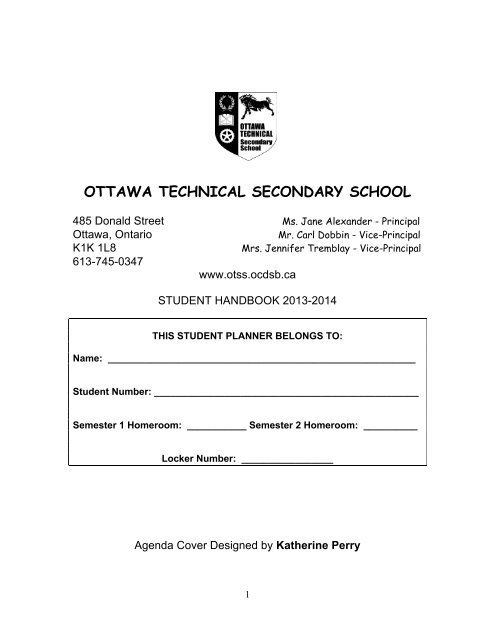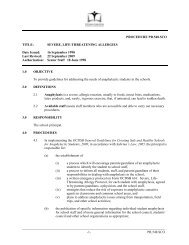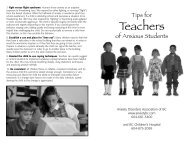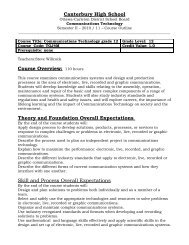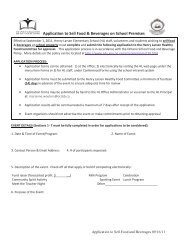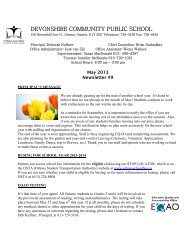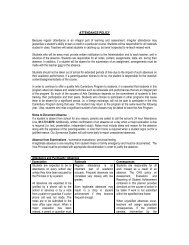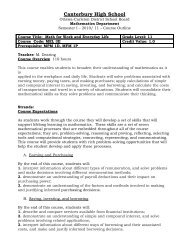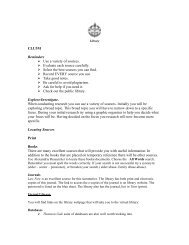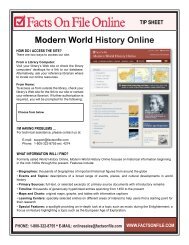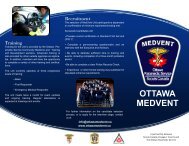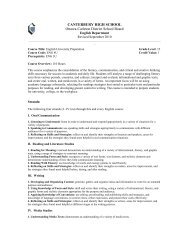2013-2014 OTSS Student Agenda - Ottawa Technical Learning Centre
2013-2014 OTSS Student Agenda - Ottawa Technical Learning Centre
2013-2014 OTSS Student Agenda - Ottawa Technical Learning Centre
Create successful ePaper yourself
Turn your PDF publications into a flip-book with our unique Google optimized e-Paper software.
SCHOOL MISSION STATEMENT<strong>Ottawa</strong> <strong>Technical</strong> Secondary School educates for the world of work, providing lifeand employability skills in an environment that encourages responsiblecitizenship and which fosters hope, inspiration and opportunity.We will work together to support and enable every student to maximize his or herpotential. This will be accomplished through staff being intentionally invitational,transparent in motive, mutually respectful and competent in their field ofexpertise.In turn, students will acquire skills in civility, work and employability, literacy,numeracy, technology, affective awareness and volunteerism. We will and dovalue positive relational development as a foundation upon which all else rests.DAILY SCHEDULEOpening exercises, announcements and attendance will take place during thefirst five minutes of the day. On scheduled Mondays, classes will meet in theirclassrooms followed by a brief assembly in the Auditorium. <strong>Student</strong>s will beassigned seats with their Day 1, Period 1 teacher.Daily ScheduleDay 1 Day 29:00 – 10:15 Period 1 Period 210:20 – 11:35 Period 2 Period 111:35 – 12:25 LUNCH12:25 – 1:40 Period 3 Period 41:45 – 3:00 Period 4 Period 3Assembly Schedule9:00 – 9:05 Attendance in 1 st Timeslot9:05 – 9:15 Travel to Assembly9:15 – 9:35 Assembly – sit with Period 1 class9:40 – 10:35 Timeslot 110:40 – 11:35 Timeslot 211:35 – 12:25 Lunch12:25 – 1:40 Timeslot 31:45 – 3:00 Timeslot 42
APPROPRIATE USE OF TECHNOLOGY – Abbreviated Version(as provided by the <strong>Ottawa</strong> Carleton District School Board)The District [OCDSB] recognizes the benefits that technology can bring tosupport student learning. The District supports and encourages responsible useof technology through the nine principles of digital citizenship. Users who aregiven access to the District’s technology, its electronic devices, or who use theirown technology or personal electronic devices in the District’s learning or workenvironment are required to know and abide by the District’s policy (P.100.ITAppropriate Use of Technology) and procedure (PR.622.IT Appropriate Use ofTechnology) to ensure that all technology is being used in a safe, legal andresponsible manner.<strong>Learning</strong> and Technology PlanThe <strong>Ottawa</strong>-Carleton District School Board’s <strong>Learning</strong> and InstructionalTechnology plan will ensure that the District’s schools are connected andrelevant. The OCDSB expects that its students will be able to access educationalresources online and engage in learning through wireless networks.Digital Citizenship<strong>Student</strong>s will use technology for educational purposes only. By accessing theInternet while on school property or by logging in with a school login, studentsaccept all terms and conditions of the appropriate use of technology policy andprocedure. <strong>Student</strong>s will demonstrate appropriate online conduct and manners.<strong>Student</strong>s must follow security procedures and use District virus scanningsoftware. Although the OCDSB uses a content filter, students may encounterinappropriate material. <strong>Student</strong>s are required to report any inappropriate use ofemail, data or unauthorized technology or data to a teacher or administratorimmediately. Information created on the District’s network may be accessed andis subject to review. Users will refrain from improper/unethical use of technology,including computer hacking, cyber-bullying, and sending or receiving offensivepictures or materials. The Internet must not be used for any purpose thatviolates the school’s Code of Conduct or the Municipal Freedom of Informationand Protection of Privacy Act.6
Personal Device UseThe OCDSB encourages the use of personally owned devices such as laptops,handheld devices or peripheral devices, in the school’s learning or workenvironment under the terms and conditions of use outlined in the District’sprocedure. Personal devices may not be used to record audio or video of peopleunless the user has been given express written permission to do so. The school’sCode of Conduct will apply to all electronic use as will the consequences.Personally owned devices used inappropriately to access/produce or shareunlawful materials will result in full investigation and if necessary, action will betaken.Consequences of MisuseIf a user violates or fails to adhere to this procedure, one or more of the followingconsequences may occur:• suspension or cancellation of use of access privileges;• payment for damages and repairs;• discipline under other appropriate Board policies, including suspension,expulsion, exclusion or termination of employment; or• civil or criminal liability under other applicable laws.STUDENT TECHNOLOGY AGREEMENTThe “Appropriate Use of Technology Intermediate/Senior <strong>Student</strong>s” Agreementcan be found on the following page. <strong>Student</strong>s are asked to complete this formand have it signed by a parent / guardian if under 18 years old. If over 18 yearsold, students can sign the form themselves.<strong>Student</strong>s are asked to remove this form from the agenda and return it to theirHomeroom teachers by Sept. 6., <strong>2013</strong>.7
Parent/ Guardian Name____________________Parent / Guardian Signature: ____________________________________________________________9
STUDENT SERVICES<strong>Student</strong> Services at <strong>OTSS</strong> are actively involved in the lives of our students. The<strong>Student</strong> Services Department consists of;• Guidance Counsellors• <strong>Student</strong> Success Teachers• <strong>Learning</strong> Support Teachers• Social Worker• Psychologist• Youth Worker• Addictions Counsellor• Youth Diversion Worker• Board consultantsIf you require supports of any kind, please visit or call <strong>Student</strong> Services forassistance. You can find <strong>Student</strong> Services by the main office.My Guidance Counsellor is:_____________________________________My Vice-Principal is: __________________________________________SCHOOL PROCEDURES AND SUPPORTSASSEMBLIESAssemblies are presented regularly to enhance learning opportunities and topromote school pride, a sense of community and “Mustang” spirit.<strong>Student</strong>s are asked to remain in the Auditorium for the duration of thepresentation to limit disruptions. Outer jackets and book bags are not permittedin the Auditorium. Hats may not be worn. <strong>Student</strong>s are expected to behave in amature manner as they would in a classroomBUS PASSES<strong>Student</strong>s who live beyond a 3 km radius of their home school and whose familiesare experiencing severe financial difficulties may be eligible to receive a buspass. Application forms are available in the Main Office. However, if thestudent’s attendance becomes an issue, the student will be not receive abus pass and instead will be given bus tickets upon successful completionof a Tracking Sheet at the end of each day.Bus tickets may only be provided to those students who meet the above criteriaand who have not yet received their bus pass. Unfortunately, the school cannotprovide tickets to students whose bus pass has been lost or stolen.10
FIELD TRIPSField trips are an essential part of the educational program. Often, there is aminor cost associated with a field trip. If students are unable to cover the cost,they are expected to speak privately with their subject teacher, guidancecounselor, or Vice-Principal well in advance.As well, extracurricular field trips are a privilege and opportunity. <strong>Student</strong>s mustcomplete all school work, attend classes and get permission from their subjectteachers before leaving on the field trip day.FOOD VOUCHERSLunch vouchers will only be provided for those students who, for reasonsbeyond their control, are not able to prepare their own lunch. Any student whomay need assistance in this area is encouraged to approach a guidancecounselor or VP. Only healthy meals will be made available.The Breakfast Program, which runs each morning in the Cafeteria, is open to allstudents. Juice, cereal, toast with jam or peanut butter is available.HALL PASSESOnly students with a hall pass, a note from a teacher / administration or a lateslip are permitted in the halls when classes are in progress. It is the student’sresponsibility to make sure they have the hall pass before leaving the classroom.GO READ A BOOK (GRAB)Once a week all staff and students will spend 15 uninterrupted minutes reading abook of their choice. The goal of GRAB is to promote literacy.LIBRARYThe Library will be open at least 15 minutes before the first period of each dayand will close after the end of regularly scheduled classes to provide studentswith an opportunity to study and conduct research. The Library will be open tostudents at lunch, but food and drink are not permitted in the Library.Borrowing Privileges:<strong>Student</strong>s are invited and encouraged to borrow library materials. <strong>Student</strong>s areasked to return materials promptly as other students may need or want to signout the items.If a student loses a book or library material, the student must pay thereplacement cost. A similar paperback can be replaced for a lost paperback withpermission from the librarian.Please ask the library staff for assistance with signing materials out, researching,finding suitable GRAB novels, etc. The teacher librarian is there to help!11
TEXTBOOKS<strong>Student</strong>s are provided textbooks on a “loan” basis. <strong>Student</strong>s are expected todemonstrate responsibility in how they care for their textbooks. <strong>Student</strong>s areexpected to return the assigned books in a reasonable condition or pay theassessed replacement value of the book.VISITORSThe safety of staff and students at <strong>Ottawa</strong> <strong>Technical</strong> Secondary School is apriority. As such, we ask that all visitors report to the Main Office and askpermission to visit. A visitor must have permission from the schooladministration (Principal or Vice Principal) to be on the property.Parents / guardians are encouraged to contact staff and administration wheneverthe need arises and request a meeting with a staff member or administration.Parents are also asked to sign in at the Main Office.What is ASSESSMENT AND EVALUATION?Rationale:The primary purpose of assessment and evaluation is to improve studentlearning. Assessment and evaluation has the potential to nurture self-esteem.<strong>Student</strong>s are expected to assume responsibility for their school work. Teacherswill work with students and parents to create a culture of responsibility.Guiding Principles for <strong>Student</strong>s1. Each student is responsible for completing the course requirements;2. Each student is accountable for completing his or her own work;3. Each student must submit required assignments on the assigned duedate;4. Each student must attempt to produce work of the highest quality basedon individual ability.12
Role of Teachers:1. Teachers will provide students with a clear description of the curriculumexpectations and evaluation criteria at the beginning of a task and/orcourse ensuring that evaluation focuses on student achievement ofOverall Expectations.2. Teachers will ensure that assessment is regular, ongoing, and varied innature, administered over a period of time and are designed to providemultiple opportunities for students to demonstrate their learning whilerecognizing different learning styles and multiple intelligences.3. Teachers will gather ongoing data about learning skills on a continualbasis to provide students with feedback to improve the performance ofthose skills.4. Teachers will provide ongoing, timely, and descriptive evidence ofachievement to students, parents/guardians prior to the formal reportingperiod.5. Teachers must take into account the strengths, needs, learningexpectations, and accommodations identified in the student’s IEP.6. Teachers of all subjects will accommodate the needs of students whoneed instruction in English as a Second Language or English LiteracyDevelopment.STUDENT EVALUATION – SECONDARY STUDENTS(PROCEDURE PR.584.CUR)Definitions:Assessment is the continuous process of gathering information about studentlearning and performance, using a variety of sources over time.Evaluation is the process of judging the quality of student work on the basis ofestablished criteria, and the assigning of a value to represent that quality.Marks:Marks will be based on an individual student’s demonstrated level ofachievement in relation to the curriculum expectations of a specific course.Teachers will use the achievement categories in conjunction with theAchievement Chart to determine towhat extent learning has taken place.Evidence will be collected over time through observations, conversations andstudent products.Marks cannot be assigned for completing homework tasks. <strong>Learning</strong> Skills andWork Habits cannot be evaluated as part of the percentage grade, and will beassessed in the <strong>Learning</strong> Skills portion of the Report Card. A majority of theOverall Expectations must be met in order for a credit for the course to beawarded.13
For grades 9 and 10, an “I” may be used on a student’s midterm report card toindicate that insufficient evidence is available to determine a percentage grade.For students who are unsuccessful fulfilling the course requirements, CreditRescue/Intervention may be offered as an alternative way to complete thecurriculum expectations and earn the credit.DETERMINATION OF MIDTERM AND FINAL GRADESTerm work is worth 70% of the final grade. This 70% should represent thestudent’s most consistent level of achievement of Overall Expectations withspecial consideration to more recent evidence of achievement.Term work will be assessed in four categories according to the departmentalpolicy and mark weighting guidelines:Knowledge & UnderstandingThinking & InquiryCommunicationApplicationThe summative evaluations are worth 30% of the final grade. Two or more finalevaluations in the form of an examination, test, performance task or othermethod of evaluation suitable to the course content are administered towards theend of the course.<strong>OTSS</strong> has a school based policy and procedure on Assessment and Evaluationwhich is accessible on our school website at http://www.otss.ocdsb.caThe OCDSB is currently reviewing the Assessment and Evaluation procedures.The procedures outlined above may be changed during the <strong>2013</strong>-14 school year.<strong>Student</strong>s and parents/guardians will be advised of any changes in the specificsubject course outlines.LEARNING SKILLS<strong>Learning</strong> Skills are considered to be a crucial component of academic success at<strong>OTSS</strong>. The six learning skills constitute a critical role in students’ achievement ofthe curriculum expectations.<strong>Student</strong>s will be evaluated separately on each of the following <strong>Learning</strong> Skills:ResponsibilityIndependent WorkInitiativeOrganizationCollaborationSelf-Regulation14
ASSESSMENT, EVALUATION AND REPORTING<strong>OTSS</strong> has an evaluation policy that is consistent with Ministry guidelines. Subjectteachers will distribute and explain to students the evaluation for their courseearly in each semester. Attendance and lates to class are recorded and can havea serious impact on a student’s performance and mark. Many courses includeactivities such as labs, quizzes, group work, projects and tests that require astudent to be present and on time.Incomplete, Missing or Skipped Assignments/Tests<strong>Student</strong>s are expected to submit assignments within the timeframe specified bythe teacher. Teachers will employ a variety of strategies to assist the student inmeeting this expectation.At the due date the teacher will:1. Remind the student about the need to complete the assignment forevaluation.2. Communicate with the parent and/or guardian to seek support for thecompletion of the assignment for evaluation.***If there comes a point where despite strategies used a student does notsubmit an assignment, the teacher will gather information about the student todetermine if there are mitigating circumstances to seek further support.Extensions may be granted at the discretion of the teacher.At the end of the reporting period, the teacher will:1. Ensure that the mark deduction (if utilized) will not result in a percentagegrade or letter grade that, in the professional judgement of the teacher,misrepresents the student’s actual achievement.2. Determine if there is sufficient evidence of the overall expectations;a. If so, report a grade using the teacher’s professional judgment.b. If not, the student receives either an “I” indicating insufficientevidence (midterm only) or a failing grade between 0% and 45%3. Communicate with the parents and/or guardians.Legitimate Absences, <strong>Student</strong> Illness or Personal EmergencyIf a student knows they are going to miss an evaluation in advance, theexpectations are that the student will:1. Inform the teacher as soon as possible2. Arrange an alternate time/day for the evaluation with the teacher.3. Ask the parent/guardian to contact the teacherIf a student is ill or if there is an emergency on the day of an in-class evaluation,a written note from a parent/guardian/physician is expected to the teacher on theday of return to school.15
IntramuralsOn occasion, additional sports activities during the school year. These add to thefun and opportunity for students to be physically active and participate in sportsfor the pure enjoyment.SCHOOL COUNCILSchool Council is an opportunity for parents/guardians to take an active role intheir child’s education. As specified by policy and Ministry regulation, SchoolCouncils are advisory bodies working with the school Principal.Council meetings cannot be used as a forum for discussion about individualparents/guardians, students, staff, trustees or other council members. If a parentwould like to discuss a specific student, they are asked to deal directly with theStaff Member and/or Principal / Vice-Principal.School Council meets on the first Tuesday of each month at 7:00 pm in theschool library. All parents are welcome and encouraged to attend.Meeting Dates for the <strong>2013</strong>-<strong>2014</strong> School Year:September 10, <strong>2013</strong>October 1, <strong>2013</strong>November 5, <strong>2013</strong>December 3, <strong>2013</strong>January 7, <strong>2014</strong>February 4, <strong>2014</strong>March 4, <strong>2014</strong>April 1, <strong>2014</strong>May 6, <strong>2014</strong>June 3 , <strong>2014</strong>18
<strong>OTSS</strong> CONTACT INFORMATIONAdministrationJane Alexander, Principal – jane.alexander@ocdsb.caJennifer Tremblay, Vice-Principal – jennifer.tremblay@ocdsb.caCarl Dobbin, Vice-Principal – carl.dobbin@ocdsb.caMain OfficeClaudia Cesario – claudia.cesario@ocdsb.caGuidance OfficeWendy White – wendy.white@ocdsb.caLaurie Sitka – laurie.sitka@ocdsb.caKitchen TechnicianMarcelle Saad – marcelle.saad@ocdsb.caTeachersAlan Abraham – alan.abraham@ocdsb.caGregor Allan – gregor.allan@ocdsb.caTanya Aston – tanya.ashton@ocdsb.caNtare Bainomugisha – ntare.bainomugisha@ocdsb.caStephen Bergin – stephen.bergin@ocdsb.caTrevor Bezzina – trevor.bezzina@ocdsb.caJennifer Bird – jennifer.bird@ocdsb.caPeter Bokovoy – peter.bokovoy@ocdsb.caIves Bolt – ives.bolt@ocdsb.caKeith Brown – keith.brown@ocdsb.caPreston Chase – preston.chase@ocdsb.caSimon Crew – simon.crew@ocdsb.caKim Crupi – kimberly.crupi@ocdsb.caLori Dales – lori.dales@ocdsb.caMolly Ensom – molly.ensom@ocdsb.caDuane Faris – duane.faris@ocdsb.caHeather Galigan – heather.galigan@ocdsb.caDiana Gaunt – diana.gaunt@ocdsbcaGail Hall – gail.hall@ocdsb.caLydia Hamilton – lydia.hamilton@ocdsb.caLiliane Jones – liliane.jones@ocdsb.caChristopher Jupp – christopher.jupp@ocdsb.caSheila Last – sheila.last@ocdsb.caAngela Linton – angela.linton@ocdsb.caRobert Lockwood – robert.lockwood@ocdsb.caMichael Loewen – michael.loewen@ocdsb.caSara Loker – sara.loker@ocdsb.caJane MacIntyre – jane.macintyre@ocdsb.caJamie McDonald – jamie.mcdonald@ocdsb.caRobert McLeod – robert.mcleod@ocdsb.caSarah McMaster – sarah.mcmaster@ocdsb.caChristine E. Newman – christinee.newman@ocdsb.caKrista Nibogie – krista.nibogie@ocdsb.caRoberta Persi – roberta.persi@ocdsb.caTed Poulsen – ted.poulsen@ocdsb.caSarah Rush – sarah.rush@ocdsb.caMichele Sauve – michele.sauve@ocdsb.ca19
NAMES AND NUMBERS OF PEOPLE HELPING YOUTHHotlinesKids Help Phone 1-800-668-6868Lesbian, Gay, Bisexual & Trans Youth Line 1-800-268-9688Drug and Alcohol Information Line 1-800-463-6273Mental Health Crisis Line 613-722-6914Operation GO HOME 1-800-668-4663Emergency HelpChildren’s Aid Society 613-747-7800CHEO Crisis Intervention 613-737-7600<strong>Ottawa</strong> Distress <strong>Centre</strong> 613-238-3311Rape Crisis Line 613-562-2333Sexual Assault Support <strong>Centre</strong> 613-234-2266Young Men’s Shelter 613-907-8975Young Women’s Shelter 613-789-8220Youth Services Bureau (YSB) 613-729-1000YSB Mobile Crisis Unit 613-562-3004Community ResourcesCommunity Legal Services <strong>Ottawa</strong> <strong>Centre</strong> 613-241-7008Dave Smith Youth Treatment <strong>Centre</strong> 613-594-8333Eastern <strong>Ottawa</strong> Resource <strong>Centre</strong> 613-741-6025Legal Aid Ontario 613-238-7931Odawa Native Friendship <strong>Centre</strong> 613-722-3811Ontario Disability Support Program 1-800-267-5111<strong>Ottawa</strong> Inuit Children’s <strong>Centre</strong> 613-744-3133<strong>Ottawa</strong> Public Health 613-580-6744Ontario Works 613-560-0624Overbrook Community <strong>Centre</strong> 613-742-5147Rideauwood Addiction and Family Services 613-724-4881Sexual Health <strong>Centre</strong> 613-234-4641Wabano <strong>Centre</strong> for Aboriginal Health 613-748-5999Food ProgramsThe Food Bank 613-745-7377Gloucester Emergency Food Cupboard 613-749-4728Emergency Food Program 613-741-9292Heron Emergency Food <strong>Centre</strong> 613-737-9090Job SearchEmployment Insurance (Service Canada) 1-800-206-7218Job Connect 613-236-8244Action 2000 Employment Services 613-236-6111To Replace Lost Identification DocumentsBirth Certificate 1-800-461-2156Ontario Health Card 1-800-664-8988Social Insurance Card 1-800-206-721821


